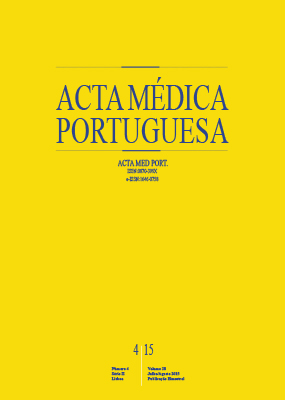Retained Textile Foreign Bodies: Experience of 27 Years
DOI:
https://doi.org/10.20344/amp.5976Keywords:
Granuloma, Foreign-Body, Foreign Bodies.Abstract
Introduction and Aim: Retained intracorporeal textile products (gossypiboma-textiloma) are undesired and accidental surgical results for both patients and surgeons, which are underreported because of medicolegal remifications. Fourteen textiloma cases, who had been treated or whose treatment procedures had been followed-up personally by two general surgeons in a period of 27 years almost during their whole professional lives were presented to describe and define the clinical and pathological characteristics.
Material and Methods: Patient characteristics including gender and age, areas of location within the body, time intervals until diagnosis, clinical presentations and complaints, treatment modalities, complications, causative surgical interventions, and diagnostic approaches were retrospectively evaluated.
Results: Nine female and five male patients with a mean age of 43.07 ± 15.23 (median: 45) years at diagnosis were enrolled in the study. Cesarean section in three, inguinal hernioraphy in four, explorative laparotomy because of acute abdomen in one, sigmoid colon resection in one, appendectomy and right salpingoophorectomy in one, etrangulated incisional hernia after a previous surgical intervention because of an ovarian mass in one, thyroidectomy in one, epigastric hernioraphy in one, and bilateral segmental mastectomy with bilateral axillary sentinal lymph node dissection in one were the causative surgical interventions. Locations of textilomas were the abdominal cavity in seven, inguinal surgical wound in four, epigastric surgical wound in one, thyroidectomy lodge in one, and bilateral axillary cavities in one patient. The mean time interval until diagnosis was 14.48 (median: 5.5) months.
Dıscussıon: Earlier recognition of foreign bodies can provide a better outcome.
Conclusion: Gossypibomas are preventable iatrogenic faults which create severe problems. Strict adherence to the rules of the operation room is a must to keep the tip of the iceberg shut in the Pandora’s box.
Downloads
Downloads
Published
How to Cite
Issue
Section
License
All the articles published in the AMP are open access and comply with the requirements of funding agencies or academic institutions. The AMP is governed by the terms of the Creative Commons ‘Attribution – Non-Commercial Use - (CC-BY-NC)’ license, regarding the use by third parties.
It is the author’s responsibility to obtain approval for the reproduction of figures, tables, etc. from other publications.
Upon acceptance of an article for publication, the authors will be asked to complete the ICMJE “Copyright Liability and Copyright Sharing Statement “(http://www.actamedicaportuguesa.com/info/AMP-NormasPublicacao.pdf) and the “Declaration of Potential Conflicts of Interest” (http:// www.icmje.org/conflicts-of-interest). An e-mail will be sent to the corresponding author to acknowledge receipt of the manuscript.
After publication, the authors are authorised to make their articles available in repositories of their institutions of origin, as long as they always mention where they were published and according to the Creative Commons license.









